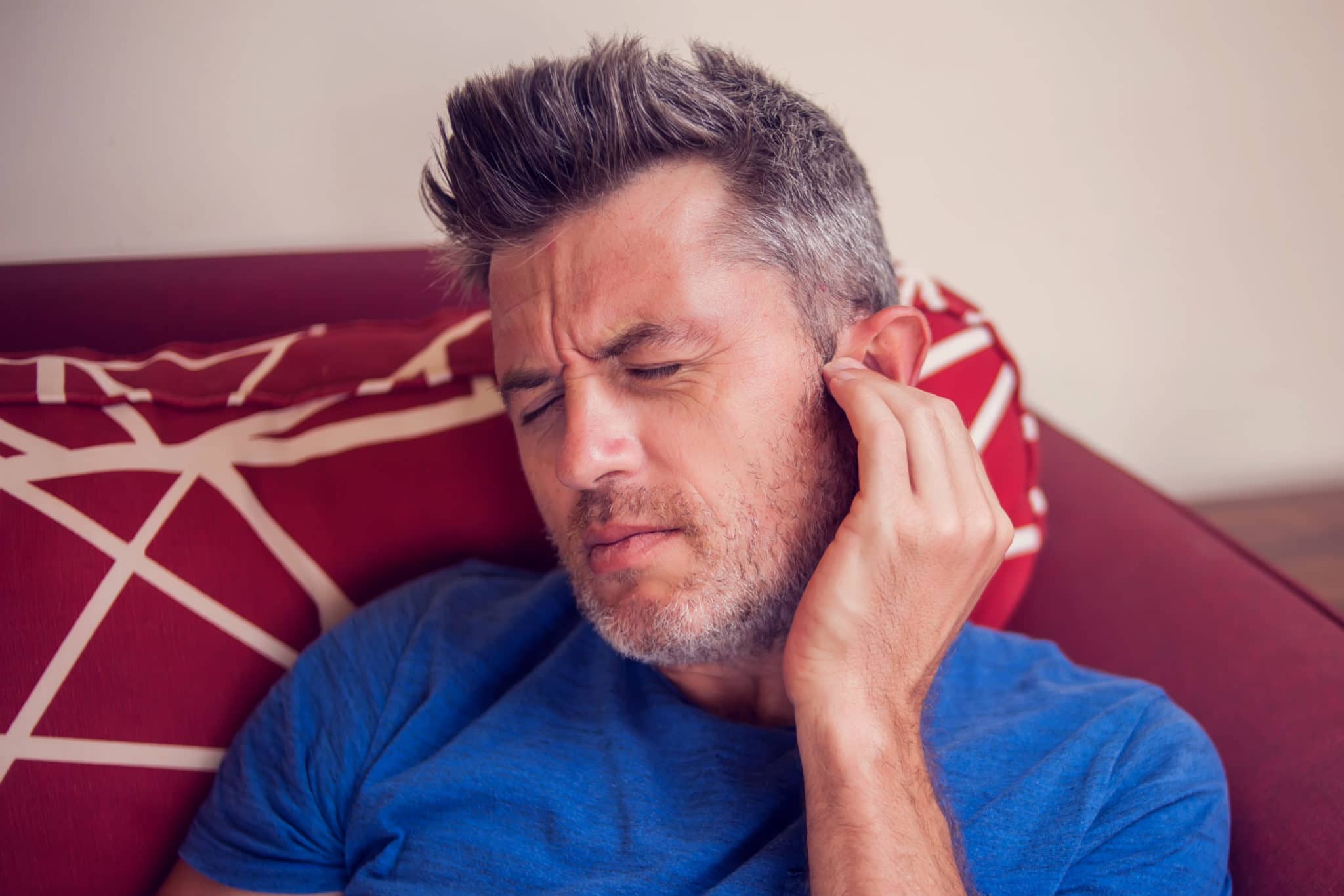What Causes Tinnitus?
Many of the patients who come to us worried about possible hearing loss also report hearing a ringing or buzzing noise in their ears. The technical name for this noise is tinnitus (pronounced tin-uh-tus), and around 15% of the population is affected by tinnitus at one time or another in their life. Tinnitus can take the form of a whooshing noise, ringing, whining, clicking, or even the sound of music. It’s often worse in quiet spaces. Sometimes, tinnitus goes away on its own, but for other people, it’s a permanent part of life.
Around 15% of the population is affected by tinnitus at one time or another in their life.
Why Do I Have Tinnitus?
Scientists don’t actually understand why certain people get tinnitus while others don’t, but they have identified some conditions that often cause it. Many times, tinnitus happens when hearing is damaged, either from a single experience or from repeated exposure to loud noises. Tinnitus can also be caused by diseases, medications, and injuries.
Common causes of tinnitus include:
- Hearing loss
- Ear blockage
- Head or neck injury
- TMJ disorder
- Balance disorders
- Brain injury
- Severe barometric trauma
- Severe congestion from a cold, flu, or sinus infection
- Inner ear disease
- Certain ototoxic medications
What Happens Over Time?
The longer you live with tinnitus, the more you’ll notice that tinnitus sounds can change over time. Sometimes tinnitus is louder, and sometimes it’s softer. Sometimes, it’s downright uncomfortable. We call these bad times tinnitus spikes, and they can be unpredictable and disturbing. When a spike happens, many people worry that the change is permanent. The more you understand about your tinnitus, what causes it, and what a tinnitus spike is, the less anxious you’re likely to feel the next time you experience a spike.
What Causes Tinnitus Spikes?
These tinnitus spikes can be caused by external factors called tinnitus triggers. The most common tinnitus triggers are stress, alcohol, medications, and lack of sleep. Tinnitus triggers can vary from one person to the next, so it can be very helpful to identify your personal tinnitus triggers. Identifying triggers can be time consuming because there are so many possible things that could cause tinnitus to occur.
Tinnitus triggers can vary from one person to the next, so it can be very helpful to identify your personal tinnitus triggers.
Typical triggers can include:
- Alcohol
- Nicotine
- Stress
- Sleep deprivation
- Certain noises or exposure to loud noises
- Caffeine
- Medications
- Supplements
- Vitamins
- Allergies
- Food sensitivities
- Changes in weather
- Diets high in sodium or sugar
- Changes in barometric pressure
- Recreational drug use
How to Find Your Tinnitus Triggers
Most of the time, tinnitus triggers are not obvious because of the time delay between the trigger and the resulting tinnitus spike. However, one of the ways that you can find your triggers is by journaling or using a tinnitus app for your phone. By tracking your behaviors, the environment around you, and the start of your tinnitus spikes, you may be able to draw a connection between the events of the day and times when your tinnitus gets worse.
When journaling, track the following:
- Diet
- Weather
- Stress levels
- Medications and supplements
- Sleep
- Exercise
- Severity of tinnitus
Doing this over a long enough period will allow you to make connections between the events on days when spikes occurred and the spikes themselves.
Track the Good Days and the Bad
While some people choose only to track tinnitus on days when it is bad, tracking tinnitus when it is less severe can help you replicate the conditions that caused the tinnitus to be less severe. The more data you have about the factors that cause your tinnitus, the easier it will be for you to avoid tinnitus spikes.
What Can You Do to Help Tinnitus?
If you have a chronic condition that causes tinnitus, there are still things you can do to manage the condition so that tinnitus doesn’t bother you as much. In addition to journaling to identify triggers, there are many other things you can do to make tinnitus seem less intrusive.
Manage Your Stress: Stress is widely believed to be a near-universal trigger for tinnitus. If you experience regular anxiety or have a very stressful job, you’re likely to have an ongoing struggle with tinnitus. The more steps you take to manage your stress, the better off you’ll be — and the more manageable your tinnitus will become. To manage your stress, you can:
- Meditate, practice mindfulness
- Get massage therapy
- Talk to a therapist who has experience helping patients manage tinnitus
- Take hot baths
- Go to a sauna
- Exercise regularly
Join a Support Group: Tinnitus is a condition that can make affected people feel frustrated, angry, and even depressed. Meeting with others who experience the same or similar problems can be a relief, and group therapy meetings provide a safe space for affected people to discuss their experiences, share what worked for them, and brainstorm solutions together. Group meetings are therapeutic and can also reduce stress by showing people they aren’t alone.
Get Enough Sleep: Lack of sleep can make tinnitus — and conditions that cause it — worse. Improving your quality of sleep and taking steps to ensure you’re getting enough sleep can help you control tinnitus symptoms. Try to make sure you’re getting at least 7 hours of sleep every night and establish a regular sleeping routine. Go to bed at the same time every night and wake up at the same time every day. Use heavy curtains to make the room dark and ensure that you’re able to fall asleep, then continue sleeping until it’s time to wake up. Sometimes tinnitus can prevent people from sleeping well. If this happens to you, try a white noise machine or phone app to help mask the sound of the tinnitus.
Try Hearing Aids: Tinnitus and hearing loss often go hand in hand. Tinnitus can make hearing sounds in the room far more difficult, which in turn can heighten stress and lead to feelings of frustration and depression, which in turn can lead to worsening tinnitus.
There are three possible ways that hearing aids can help with tinnitus. They can:
• Give the brain the missing sensory input that is causing tinnitus in the first place
• Amplify sounds in the environment to help mask the tinnitus
• Provide sound therapy that decreases your awareness of tinnitus
Your audiologist can help you evaluate your tinnitus and find the best hearing aid for your needs.
Can Tinnitus Be Prevented?
Sometimes, tinnitus is caused by damage to the ear from loud noises. You can help prevent tinnitus by avoiding very loud noises and wearing ear protection if you are regularly exposed to loud noises. Some types of tinnitus are the result of chronic conditions and cannot be prevented. However, tinnitus can also be caused by problems like ear infections, which can be treated.
You Don’t Have to Suffer Alone
If you develop permanent or chronic tinnitus, we’re here to help you find ways to be more comfortable and reduce your tinnitus and its triggers. During a comprehensive hearing exam, your hearing specialist can conduct a tinnitus questionnaire and inventory to help understand your condition.
If hearing aids might be a good solution for your tinnitus, we can talk through options to help you find the best devices to fit your needs and lifestyle. Our goal is to help you hear sounds that you want to hear over the sound of the tinnitus, and together, we can manage your condition and improve your quality of life.
For specific questions about tinnitus, please book an appointment with our tinnitus experts.
Sources
- Hearingloss.org, A Message of Hope for Tinnitus Sufferers
- Tinnitus.org, Spike in Your Tinnitus During COVID-19
- American Tinnitus Association, Understanding the Facts


